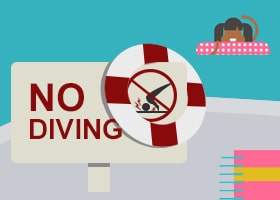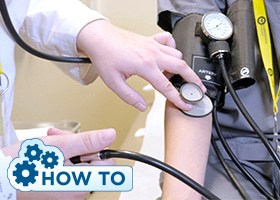Stress is a commonly shared emotion among medical assistant students. The constant coursework, family needs, social events, part-time jobs and extracurricular activities can turn life into a balancing act with each new activity precariously being added to the pile. In fact, a study conducted by the Associated Press and mtvU found that “80 percent of college students say they frequently or sometimes experience daily stress.”1  Students attending medical assisting programs not only have to deal with the factors above, but also have to handle patient care – patients who are often experiencing their own degrees of stress. Frequently interacting with ailing patients is understandably a tough aspect of health care. Learning to control the stress associated with these new tasks can be difficult, but not impossible. In fact, implementing some of the tips below could help diminish that stress: Getting exercise Taking an hour out of the day for a run, a walk or a quick yoga session can have healing benefits. The added movement can help stretch muscles tense from sitting hunched over a computer and ease stressful thoughts, like learning how to take blood samples and give injections. Getting active also increases blood flow to your brain, supplying it with plenty of oxygen, nutrition and energy which can help with mental processing.2 In addition, a survey conducted by the American Psychology Association found that 62 percent of adults who said they exercise or walk to cope with stress felt the strategies were extremely effective.3 Planning ahead Having an organized day can make the many responsibilities and duties of student life seem much more manageable. Getting a physical day planner is cheap and easy, if you prefer to have a solid book in your hands, and once tasks are added to the pages there’s no more need to worry about forgetting an assignment or meeting. If you prefer to have one less item stuffed in your backpack, however, there are plenty of apps and calendars to use on digital devices that will block out hours of your day and even give you notifications when certain events are approaching. Another idea to keep in mind is scheduling fun activities. Carve out a chunk of time each day to get coffee with friends or to just sit alone and read a book for leisure. Having this personal time will give your mind a rest from thinking about how to assist with routine patient procedures. Visiting furry friends Forget about looking for an externship and interviews for a little while and go to an animal shelter or find a friend with a pet. Aside from being adorable, animals have been found to reduce anxiety. The Journal of Creativity in Mental Health reported that participants of a study “found a 60 percent decrease in self-reported anxiety and loneliness symptoms following animal-assisted therapy.”4 Seeking support There are a couple different types of support you can seek while attending medical assisting programs. The first is help from friends or family: Having someone close to lean on when schoolwork and other life events get too tiring is invaluable. If you don’t feel comfortable discussing stressful matters with friends or family, counseling is always an option. Speaking to a professional about life anxieties is a way to vent about your worries and handle taxing situations, such as learning to assist physicians with in-office surgical procedures. There are many other ways to deal with stress, but finding the right set of methods to personally fit your needs takes trial and error. Try one or a combination of the suggestions above to see which ones work best for you. 1“Facts,” Anxiety and Depression Association of America, 2008. http://www.adaa.org/finding-help/helping-others/college-students/facts 2“Get Moving and Boost Your Brain Power,” American Heart Association, May 2014. http://www.strokeassociation.org/STROKEORG/LifeAfterStroke/HealthyLivingAfterStroke/PhysicalActivity/Get-Moving-and-Boost-Your-Brain-Power_UCM_453575_Article.jsp 3″Exercise: A healthy stress reliever,” American Psychological Association, 2013. http://www.apa.org/news/press/releases/stress/2013/exercise.aspx 4“A Pilot Study Assessing the Effectiveness of an Animal-Assisted Outreach Program,” Journal of Creativity in Mental Health, Sept. 2014. http://www.tandfonline.com/doi/full/10.1080/15401383.2014.892862
Students attending medical assisting programs not only have to deal with the factors above, but also have to handle patient care – patients who are often experiencing their own degrees of stress. Frequently interacting with ailing patients is understandably a tough aspect of health care. Learning to control the stress associated with these new tasks can be difficult, but not impossible. In fact, implementing some of the tips below could help diminish that stress: Getting exercise Taking an hour out of the day for a run, a walk or a quick yoga session can have healing benefits. The added movement can help stretch muscles tense from sitting hunched over a computer and ease stressful thoughts, like learning how to take blood samples and give injections. Getting active also increases blood flow to your brain, supplying it with plenty of oxygen, nutrition and energy which can help with mental processing.2 In addition, a survey conducted by the American Psychology Association found that 62 percent of adults who said they exercise or walk to cope with stress felt the strategies were extremely effective.3 Planning ahead Having an organized day can make the many responsibilities and duties of student life seem much more manageable. Getting a physical day planner is cheap and easy, if you prefer to have a solid book in your hands, and once tasks are added to the pages there’s no more need to worry about forgetting an assignment or meeting. If you prefer to have one less item stuffed in your backpack, however, there are plenty of apps and calendars to use on digital devices that will block out hours of your day and even give you notifications when certain events are approaching. Another idea to keep in mind is scheduling fun activities. Carve out a chunk of time each day to get coffee with friends or to just sit alone and read a book for leisure. Having this personal time will give your mind a rest from thinking about how to assist with routine patient procedures. Visiting furry friends Forget about looking for an externship and interviews for a little while and go to an animal shelter or find a friend with a pet. Aside from being adorable, animals have been found to reduce anxiety. The Journal of Creativity in Mental Health reported that participants of a study “found a 60 percent decrease in self-reported anxiety and loneliness symptoms following animal-assisted therapy.”4 Seeking support There are a couple different types of support you can seek while attending medical assisting programs. The first is help from friends or family: Having someone close to lean on when schoolwork and other life events get too tiring is invaluable. If you don’t feel comfortable discussing stressful matters with friends or family, counseling is always an option. Speaking to a professional about life anxieties is a way to vent about your worries and handle taxing situations, such as learning to assist physicians with in-office surgical procedures. There are many other ways to deal with stress, but finding the right set of methods to personally fit your needs takes trial and error. Try one or a combination of the suggestions above to see which ones work best for you. 1“Facts,” Anxiety and Depression Association of America, 2008. http://www.adaa.org/finding-help/helping-others/college-students/facts 2“Get Moving and Boost Your Brain Power,” American Heart Association, May 2014. http://www.strokeassociation.org/STROKEORG/LifeAfterStroke/HealthyLivingAfterStroke/PhysicalActivity/Get-Moving-and-Boost-Your-Brain-Power_UCM_453575_Article.jsp 3″Exercise: A healthy stress reliever,” American Psychological Association, 2013. http://www.apa.org/news/press/releases/stress/2013/exercise.aspx 4“A Pilot Study Assessing the Effectiveness of an Animal-Assisted Outreach Program,” Journal of Creativity in Mental Health, Sept. 2014. http://www.tandfonline.com/doi/full/10.1080/15401383.2014.892862



